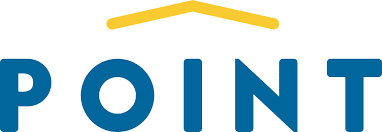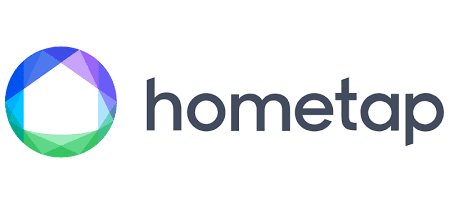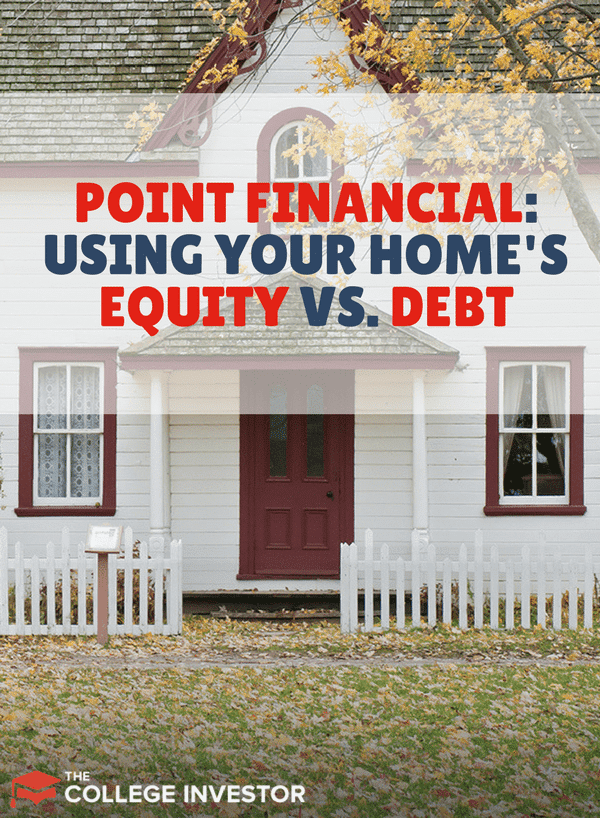
Point is a HELOC alternative.
What if you could sell shares in the equity of your home just like you can sell your shares in stocks like Apple or Google ?
Owning a home is supposed to be the ultimate asset for every American who buys one and owns equity in it. But what if, instead of getting a mortgage (i.e. taking on debt), you could sell a piece of the equity - just like a stock.
Well, that's what Point is doing, and it has some intriguing uses - including being used as a "bridge loan" to cover the costs for buying a new house, to paying off high interest debt.
Point is offering Home Equity Investment (HEI). It's an alternative to a HELOC. Keep reading to learn more about how it works and to see if selling equity in your home could be worth considering.
Point Details | |
|---|---|
Product Name | Point |
Equity Access | $25,000 to $500,000 |
Term | 30 Years |
Fees | 3-5% Transaction Fee |
Promotions | None |
What Is Point?
Point is a California-based company that's been around since 2014 and appears to be growing with each year. It offers an alternative way to access equity in your home.
Traditionally, the only ways to do that (other than selling your home) were to refinance or take out a home equity line of credit. The problem is that with both those options you will increase your debt.
What if you could receive a lump sum of money that is a portion of the equity in your home for much-needed financial expenses. That is what Point offer to homeowners who want to extract cash from their home's equity without going into severe debt.
Point currently operates in the following states: California (only certain counties), Colorado, Connecticut, Georgia, Hawaii, Illinois, Massachusetts, Maryland, Michigan, Minnesota, New Jersey, New York, North Carolina, Ohio, Oregon, Pennsylvania, Tennessee, Utah, Virginia, Washington, Washington D.C.
What Does It Offer?
When Point allows you to extract cash from the equity of your home, you don't have to pay them back in monthly payments ever. However, you may choose to end the settle your investment anytime before the 30 years.
If your home appreciates, you will pay Point back the lump sum you were given as well as a certain percentage of the home’s current value (usually between 25-40%). On the flip-side, if your home drops in value, Point will share in the loss with you.
When you sell shares in your home equity to Point, they do not become a co-owner of your property. They're simply becoming a partner in the home's change in value when you decide to end the agreement. They secure their interest in the property with a Deed of Trust just like a lender would.
30-Year Terms
Yes, you will have to pay Point back but unlike traditional bank products, Point does not require any monthly payments. The Point HEI typically ends when:
As mentioned earlier, when you decide to end the Point HEI, you will pay Point the money you were given for the shares in your property and their prescribed percentage of the change in value of the home. This is how they potentially earn a profit.
Since Point is a Fintech company, it uses several algorithms which allow the company to know how much your home is likely to appreciate over the next 30 years.
Risk Adjustments
One of the downsides of using Point when compared to some of its competitors like Unison or Hometap is that it will reduce your home's appraised value 15% to 20% right off the bat. It calls this reduction a "risk adjustment" in case your home decreases in value.
Honestly, we're not fans of this risk adjustment. The odds are already in Point's favor that it will earn a profit on its investment in your home due to the fact that home values tend to rise over time. But Point stacks the deck even further its own favor by adjusting your home's initial value to 75-80% of its appraised value.
Investments In Rental Properties
Most home equity sharing companies will only make investments in homes that are owner-occupied. But Point is unique in that it doesn't require you to be living in a home to access a portion of its equity.
You'll pay a "Rental Premium" if you decide to take out an investment on a rental property though. Point says that this premium is typically 10% of its typical appreciation share.
So, for example, if Point would receive a 30% share of the appreciation of an owner-occupied home, it would receive a 33% share of the growth of the same property if it's occupied by renter.
Are There Any Fees?
There are a few fees associated with Point. You will have to pay for the home visit with the appraiser. This will typically cost between $500 and $820.
Point also collects a 3%-5% transaction fee. Note: The homeowner will not be responsible to pay any of these upfront fees out of pocket. They will all be deducted from the wire prior to sending funds into your bank account.
Finally, when the time comes to settle your investment, Point will charge a $45 Reconveyance Service Fee and $30 Payoff Demand Statement.
How Does Point Compare?
When compared to its competitors, Point has two features that set it apart. First, it gives homeowners up to 30 years to settle their investments. Unison does too, but Hometap investments must be settled within 10 years.
Second, Point will invest in rental properties. This is something that Unison and Hometap are both unlikely to allow. You'll have to give away a slightly higher share of the home's appreciation if it's an investment property, but it could still be a compelling option if you're looking to access equity from an investment property
Despite these benefits, the risk adjustments that Point applies are a big negative. Unless you're a rental property owner, Hometap or Unison are probably better choices. Why immediately give up 15% to 20% of your home's appraised if you don't have to?
Check out the full list of HELOC alternatives here.
Here's a closer look at how Point compares.
Header |  |  | |
|---|---|---|---|
Rating | |||
Equity Access | Up to $500,000 | Up to $600,000 | Up to $500,000 |
Term | 30 years | 10 years | 30 years |
Fees | 3-5% | 3% | 3% |
Risk Adjustment | 15% to 20% | N/A | N/A |
Min Credit Score | 500 | 500 | 620 |
Cell |
How Do I Apply With Point?
To qualify for Point’s program, you should typically have 35% or more equity in your property (however, it can be as low as 20%).You can sell equity in the following properties:
- Your primary residence
- Second home
- Condo
- Townhome
- Non-owner occupied single family home
- 1-4 Unit Multifamily
Note: W2 income is NOT required to apply for Point. So if you are self-employed, unemployed, retired, etc., you can still qualify for an HEI.
If you meet the above requirements, you can simply click on the link here, enter in your information, and answer a few pre-qualifying questions. A pre-qualification decision will be provided within 5 minutes of you entering in your information.
How Would This Work In Real Life?
Looking for some real-life use cases of a Point investment. Let's dive into two scenarios where Point could really make sense.
Using Equity Like A Bridge Loan
Let's say you're looking to buy a home in a hot housing market. You currently have a $500,000 mortgage, and a $1,000,000 home. You have about $50,000 in cash, but that's not enough to make a "good down payment" for your offer on your new home. Remember - it's a hot housing market.
You could take out a HELOC and get more cash out of your house - you have $500,000 in equity. But the problem? Taking out a HELOC will negatively impact your debt-to-income ratio, and could jeopardize getting your new mortgage.
That's where Point comes in. If you sell the equity in your home, you walk away with cash that you can use for the down payment on your next house. But since it's equity, it doesn't show up on your credit report, there are no monthly payments, and you don't impact your debt-to-income ratio.
When you sell your old house, Point takes their equity back in escrow. This is a great scenario for using Point to sell equity.
Using Equity To Pay Down Debt
Another great use case for Point and selling equity in your home is to pay off high interest debt. For example, say you have high interest credit cards or student loans and you're looking for a way to get rid of them. Beyond saving interest payments, you want to improve your debt to income ratio (maybe to buy a future home) and improve your credit score (to qualify for better rates and terms).
Selling equity in your home is a great use case for this versus alternatives like refinancing the debt, or taking out a personal loan to pay of credit cards.
With both refinancing and a personal loan, you still have the debt on your credit report, and you're still paying interest on the debt - likely high interest too even in the best cases.
If you used equity in your home, you could literally be debt free (or at least consumer debt free). Once again, since equity doesn't show up on your credit report or require monthly payments, the savings in interest alone could be substantial. Plus, you'll likely boost your credit score significantly in the process.
Is It Safe And Secure?
Yes, Point isn't a scam. It's been in business since 2014 and its product works as advertised. Its website is also encrypted and, according to its Privacy Policy, Point does not sell its customers' sensitive information with third parties.
How Do I Contact Point?
You can get in touch with Point by phone at 888-764-6823. Operating hours are Monday-Thursday, 6 AM - 6 PM (PST) and Friday, 6 AM - 4 PM (PST). You can also reach out by email at help@point.com.
Point has an "Excellent" customer service rating on Trustpilot of 4.6/5 from over 450 customer reviews. It's also currently rated A+ with the Better Business Bureau (BBB).
Is It Worth It?
If you’ve been denied a home equity line of credit from your bank and need to access a portion of your home equity, using a equity sharing company like Point might be a great alternative for you.
To be clear, you could end up paying more overall to settle a Point investment than it would cost you to pay back a HELOC of the same amount. However, you won't be required to pay a cent until you sell your home (or 30 years go by) and you'll have downside protection too.
If the idea of equity sharing interests you, you may want to read our Unison and Hometap reviews as well to make that you've fully compared all of your options.
Point FAQs
Let's answer a few common questions that people ask about Point:
Does Point provide home remodeling adjustments?
No, unlike some of its competitors, it doesn't appear that Point will adjust the final value of your home based on renovations you've made that have changed its value.
Can I buy out Point before my term ends?
Yes, you can settle your agreement with Point at any time, whether you sell your home or not.
Can Point force me to sell my home?
Yes, if you're unable to use cash or take out a loan to buy out Point at the end of your term, it could force a sale of your home in order to receive its share of your home's current value.
What happens if I die before I settle my agreement with Point?
Nothing will change and no payment will be due. Your contract with Point will transfer to your heir(s) and the originally agreed-upon terms will apply.
Point Features
Equity Access | $25,000-$500,000 |
Transaction Fee | 3-5% |
Rental Premium | Generally 10% of Point's share of appreciation |
Reconveyance Service Fee | $45 |
Payoff Demand Statement | $30 |
Full Appraisal | $500-$820 |
Changes to Title | $250 |
Term | 30 years |
Max Loan-to-Value Ratio (LTV) | ~80% |
Minimum Credit Score | 500 |
Prepayment Penalty | No |
Interest Rate Type | N/A |
Customer Service Number | 888-764-6823 |
Customer Service Hours | Mon-Thu 6 AM - 6 PM (PST) |
Customer Service Email | hello@point.com |
Promotions | None |
Point: Selling Equity In Your Home
-
Rates And Fees
-
Products and Services
-
Ease Of Use
-
Customer Service
Overall
Summary
Point is a unique Fintech company that allows you to sell equity in your home to investors.
Pros
- Great way to tap your home’s equity, especially to pay off high-interest debt
- No monthly payments
- Agreement is a 30-year term
- Point will invest in rental properties
Cons
- “Risk adjustments” reduce your home’s appraised value by 15-20%
- Fees may be higher than going a traditional HELOC route

Robert Farrington is America’s Millennial Money Expert® and America’s Student Loan Debt Expert™, and the founder of The College Investor, a personal finance site dedicated to helping millennials escape student loan debt to start investing and building wealth for the future. You can learn more about him on the About Page or on his personal site RobertFarrington.com.
He regularly writes about investing, student loan debt, and general personal finance topics geared toward anyone wanting to earn more, get out of debt, and start building wealth for the future.
He has been quoted in major publications, including the New York Times, Wall Street Journal, Washington Post, ABC, NBC, Today, and more. He is also a regular contributor to Forbes.
Editor: Clint Proctor Reviewed by: Ashley Barnett
